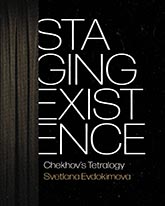|
Staging Existence
Chekhov’s Tetralogy
Svetlana Evdokimova
“The most comprehensive treatment of Chekhov’s thought to date, linking his famous poetics of understatement to enduring philosophical questions. This is a mature work of scholarship, organically structured, intellectually stimulating, and highly readable, presenting a series of bracing new interpretations at perfect pitch. Any reader of Chekhov should read this book.”
—Carol Apollonio, author of Simply Chekhov
Anton Chekhov is justly famous as an author and a playwright, with his work continuing to appear on stages around the world more than a century after his death. However, he is rarely studied for his intellectual and philosophical theories. His disinterest in developing a “unified idea”—as was in vogue for Russian intellectuals of his time—and his aversion to the maximalism characteristic of contemporary Russian culture and society set him apart from his fellow writers. As a result, Chekhov’s contribution to intellectual and philosophical discourse was obscured both by his contemporaries and by subsequent scholars.
Svetlana Evdokimova fills this gap in Chekhov scholarship, examining the profound connections between his unstated philosophy and his artistic production. Arguing that Chekhov’s four major plays (The Cherry Orchard, Three Sisters, The Seagull, and Uncle Vanya) constitute a kind of cycle, Staging Existence offers a major reappraisal of this critical playwright in Russian intellectual history. Evdokimova’s deep, careful research into Chekhov’s engagement with contemporary philosophy provides insight into both Chekhov’s oeuvre and the writer himself.
Svetlana Evdokimova is a professor of Slavic studies at Brown University. She is the author of several books, including Dostoevsky beyond Dostoevsky: Science, Philosophy, Religion and Pushkin’s Historical Imagination.
Svetlana Evdokimova's Facebook - https://www.facebook.com/profile.php?id=100014173479208
Praise
“A comprehensive and multifaceted study of Chekhov’s plays, Staging Existence underscores the subtle connection between Chekhov the thinker and Chekhov the artist, making the persuasive case that one cannot be understood without the other. Exhaustively researched, lucidly written, and convincingly argued, this is one of the most important studies of Chekhov in recent decades.”
—Radislav Lapushin, author of “Dew on the Grass”: The Poetics of Inbetweenness in Chekhov
“Erudite and substantial. . . . Offers a clear-eyed critique of a polarized society caught in a self-destructive tailspin. Chekhov is present here as a valuable antidote not just to his own time, but possibly to ours as well. . . . We can perceive Chekhov’s distinctive form of activism, a combination of social conscience and mental vigilance, reminding us that we need to learn how to hold irreconcilable realities together.”
—The Russian Review
Table of Contents
Contents
Introduction
1. Chekhov’s (Anti–)Philosophy
2. Life without a Plot: The Drama of Being
3. Seagull Is a Seagull Is a Seagull: Chekhov’s What Is Art?
4. Dostoevsky’s Graft: “Ward Six,” The Wedding, The Three Sisters, and Uncle Vania
5. Homo Laborans: The Ontology of Work in Uncle Vania and The Three Sisters
6. The Three Sisters: Being as Event
7. The Temptations of the Nursery
8. Back to the Cherry Orchard: “Let Us Cultivate Our Garden”
Conclusion
Notes
Bibliography
Index
|

Larger images
November 2023
302 pp. 6 x 9
|

